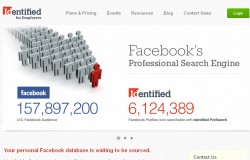 I’m a zero. So are many of my friends. The wonder is, I really don’t care and I’m not going to do anything about it.
I’m a zero. So are many of my friends. The wonder is, I really don’t care and I’m not going to do anything about it.
Let me explain. Yesterday, Forbes, TechCrunch, and some others detailed the beta launch of Identified. This is a startup that connects to your Facebook profile and assigns you a score that in the words of the company’s PR “shows people how their professional brand is perceived by the world.”
Identified assesses your work history, education, and your social network, crunches it together, and voila, a score. Since this is supposed to be a recruiting tool — it’s billed by the founders as the “World’s Largest Professional Search Engine” — companies can use Identified to search for candidates with certain qualifications, plus a score range. And just so everyone knows they really are using Identified, there’s an activity box that lets you know “Levi Strauss & Co. has viewed profiles of candidates with scores from 16 to 77.”
Some very smart people have poured a bunch of money into Identified; $5.5 million from the likes of Bill Draper, founder of Sutter Hill Ventures and Draper Richards; Alexander Tamas, partner at DST; Chamath Palihapitiya, a VP at Facebook; and from Innovation Endeavors, a VC founded by former Google CEO Eric Schmidt.
The founders say Identified is an alternative, even a competitor, to LinkedIn.
The problem with LinkedIn, founder Brendan Wallace told Forbes, “is it just outputs a lot of data. We’re really a search engine that delivers professional information in a professional way. You get the best results at the top.”
Ranking candidates is nothing new. ATS vendors and job boards have been at it for more than a decade. Their method is to rank candidates against the description of the job for which they’re being considered. Even the least sophisticated match keywords, ranking candidates on the number of matches. Better systems take a semantic approach, looking to concepts and context as much or more than the frequency of keyword matches.
Identified weights the breadth and quality of a person’s network. Says Wallace:
We saw that companies cared as much about a person’s network as they did about their education and work experience. So we built Identified to show people how they appear to world based not only on what they know, but who they know.
Forbes addresses some of the obvious issues with the Identified approach, including what it calls the “philosophical question” of reducing a person and their contacts to a score.
For recruiters, though, there are bigger issues with Identified. The biggest is that Facebook itself says that less than half the 700 million users enter any of their professional information. How many, like myself for instance, provide a minimal bit isn’t known. That skews Identified’s scoring. For people who really care, Identified encourages you to fill-in the missing information to improve your ranking.
Even with some detailed work and education background, the other part of the system can skew the results. Like so many social networkers, I use LinkedIn professionally, and Facebook socially. My Facebook friends have an eclectic assortment of professional experience and education. Most don’t bother with those categories.
My business colleagues are almost exclusively part of my LinkedIn network.
So I’m a zero on Identified because I chose not to provide much professional and personal background and few of my friends do either. As a recruiter, how valuable is that?
And I thank you in advance for not taking the obvious opening provided in my first paragraph.